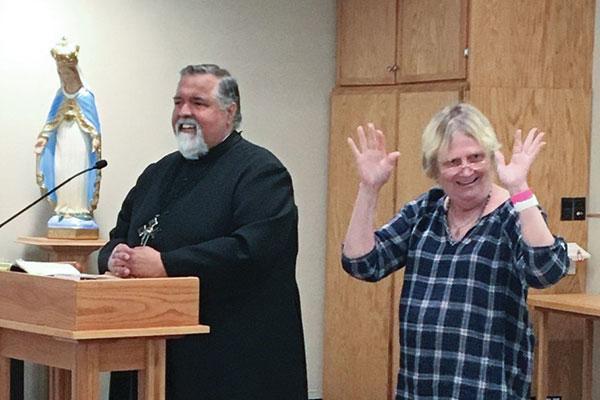
Plans, Purgatory, and Perfection
by Terry Peloquin
"Every year, something comes up that we didn't plan," began Fr. Dan Cambra, MIC, at the 9th Annual Mercy for Souls Conference, Sept. 8. Beside him stood Marilyn Cassidy of Waban, Massachusetts, interpreting his words into American Sign Language.
John Flora, who is deaf, came from Glenville, New York, for his second Mercy for Souls Conference, even though there hadn't been a translator at last year's event. "I planned to sit up front and get as much out of the talk as possible," John said.
Then, minutes before Fr. Dan's talk began, John met Marilyn, a Holy Souls Sodality member who is a mother of seven (three of whom are deaf) and grandmother to 15 (eight of whom are deaf). "I told Fr. Dan I'm not a certified interpreter, but I'd make a try."
This moment was one of many unplanned turns that could not have worked out better if they had been planned.
Take the conference's prepared theme: "Saint Faustina's Mission for the Dying and the Souls in Purgatory." Although both topics came up in Fr. Dan's talk, two other themes dominated: suicide and interconnectedness.
To start the conference, Fr. Dan, the spiritual director of the Holy Souls Sodality, presented a short trailer for the new Marian Press book After Suicide: There's Hope for Them and for You by Fr. Chris Alar, MIC, and Jason Lewis, MIC. The video intoned:
We entrust our lives, our wills, and deceased loved one into God's care and protection. ... God is eternal and everything is one moment to Him. And our prayers can affect the disposition of somebody back in time. And that has implications, not just for someone who's died by suicide, but it also has implications for anybody who has died for accidental reasons or that didn't receive the Sacraments before they died.
This year's conference theme would have a different angle, Fr. Dan explained, because of the new book and because he had heard from people who had a family member, neighbor, or co-worker who died by means of suicide.
"How shocked I was when Fr. Cambra said the focus of the conference was on souls who died from suicide," Marilyn said. "Our only son and oldest deaf child committed suicide in 2007 at the age of 37. I felt like the whole conference was aimed toward our experiences. I was thrilled to have the opportunity to interpret that conference for John Flora. And by the way, our son's name is John, too."
Another guest, Thérèse Côté of Chicopee, Massachusetts, also found comfort and confirmation through Fr. Dan's talk. "I lost a nephew to suicide," Thérèse said. "We never, never suspected he would take his life. He was successful, young, and newly married to a wonderful woman," she recalled. "I know I'm doing the right thing praying for him. I'm doing all the spiritual practices Fr. Dan said." She prays a daily Rosary and has a little home altar for daily prayer.
The conference's theme was personal for Fr. Dan, too. He explained that, a year or two before he joined the Marian Fathers of the Immaculate Conception, he was working in Tallahassee, Florida. "One of my co-workers had committed suicide on Friday," he said. "His body was still sitting in the chair in the office next to mine when I came to work on Monday morning." Father Dan knew the man as a pleasant co-worker. "That affected me rather strongly.... It made me think that maybe I needed to rediscover an earlier vocation and to find a different life."
Father Dan said that a suicide can have lasting effects on others. "People who know someone that committed suicide feel absolutely helpless, and very often they spend hours, days, years asking themselves, 'What did I do wrong that I wasn't able to save my loved one from suicide?' Or my co-worker. How is it that I didn't do something to prevent this terrible, terrible mistake from happening?
"First of all," he said, "it is not your fault. Secondly, it was probably not their fault either. They were most likely overwhelmed by a sense of sheer powerlessness.
"And so I put it to you: Who is it that would inspire someone to have a sense of powerlessness? The devil. No one else. The devil. Sometimes when people refer to the devil as Satan, what they don't realize is that word satan in Hebrew in its original use simply means adversary. The devil is the adversary of God. He is the adversary of life. He is the adversary of all that is good, loving, and wise.
"It's important," Fr. Dan continued, "that we have that fixed in our minds clearly. It's important that we realize we are the front line of an army that Mary is pulling together."
Father Dan alluded to the high numbers of armed service people who, in a hopeless moment, die by means of suicide. "What if somebody had sent them some holy cards in a care package from an anonymous parish? Your parish. What if they had received some words of encouragement from an Army chaplain? Would that maybe have made the difference? We never know. Maybe if you and I started thinking about praying for people who feel so desperately alone, that maybe they might encounter a friend or someone who would give them reason to trust in God's providential care."
In Fr. Dan's homily at Holy Mass later that day, the theme of interconnectedness reappeared. "The truth of the matter is we all have a responsibility for one another.
"Why?" Fr. Dan asked rhetorically. "Because we're all part of the Body of Christ. We're all interconnected.
"The souls in Purgatory and the saints in Heaven pray for all of the living daily. It is the responsibility of you and I as part of the Church Militant to pray for the souls in Purgatory and to invoke the intercession of the saints. It is part of the constant weaving of the tapestry of humanity as we slowly come together in the Heart of God and become the people He called us to be at Baptism."
Now there is a great plan.
To order After Suicide: There's Hope for Them and for You (AI-ASTH), visit shopmercy.org/hope or call 1-800-462-7426.

